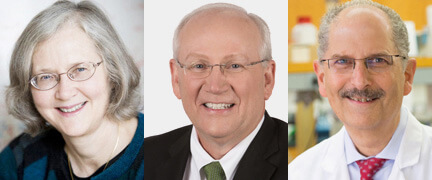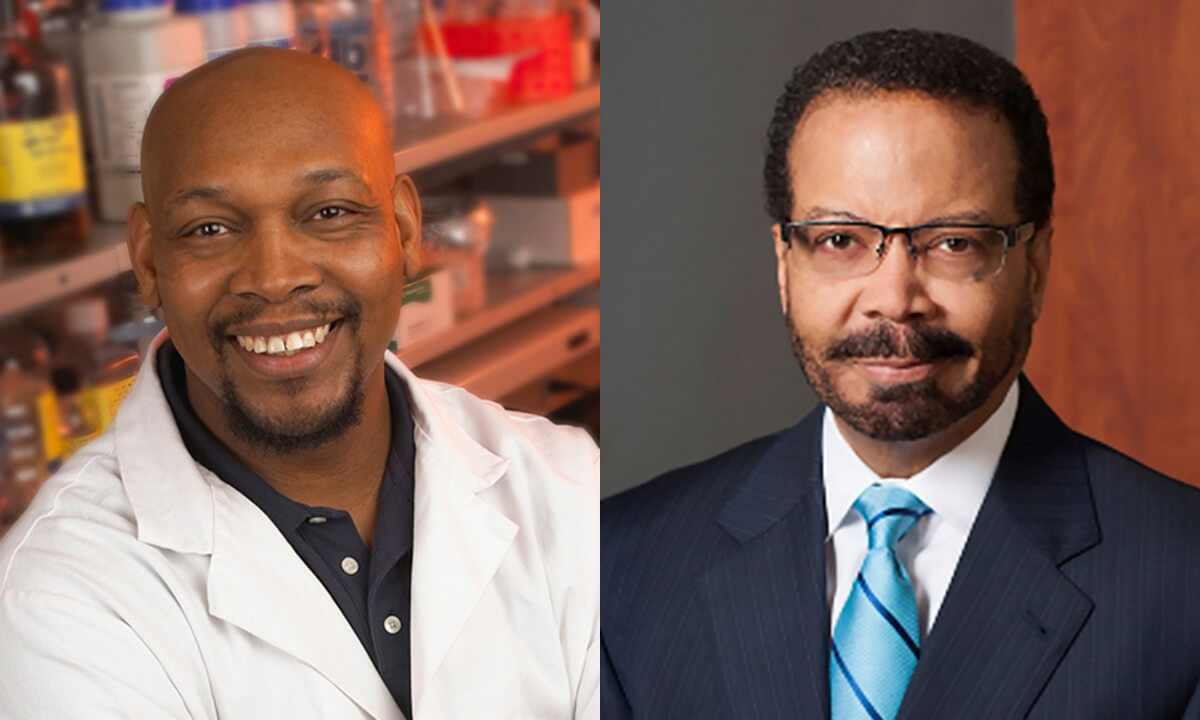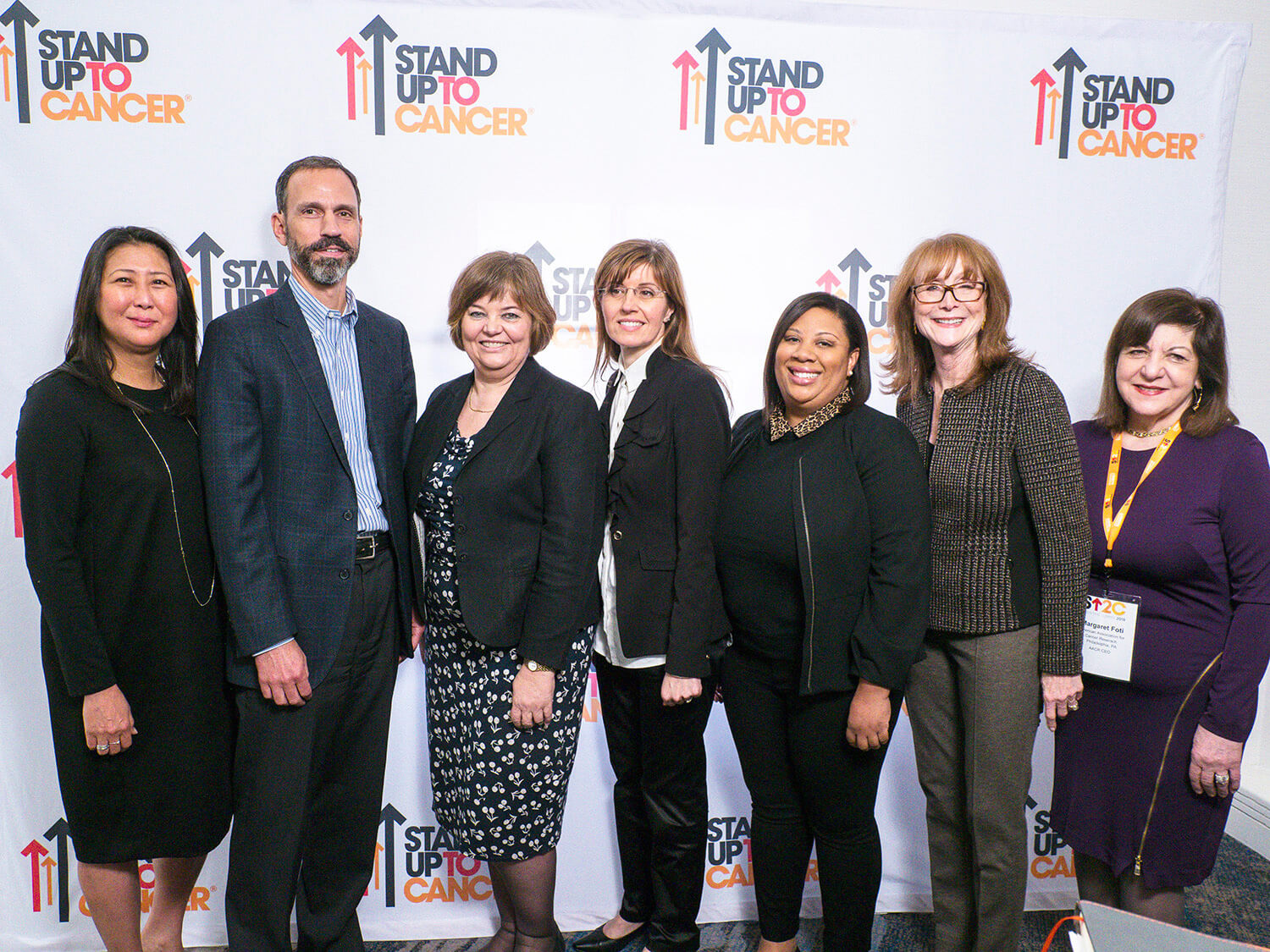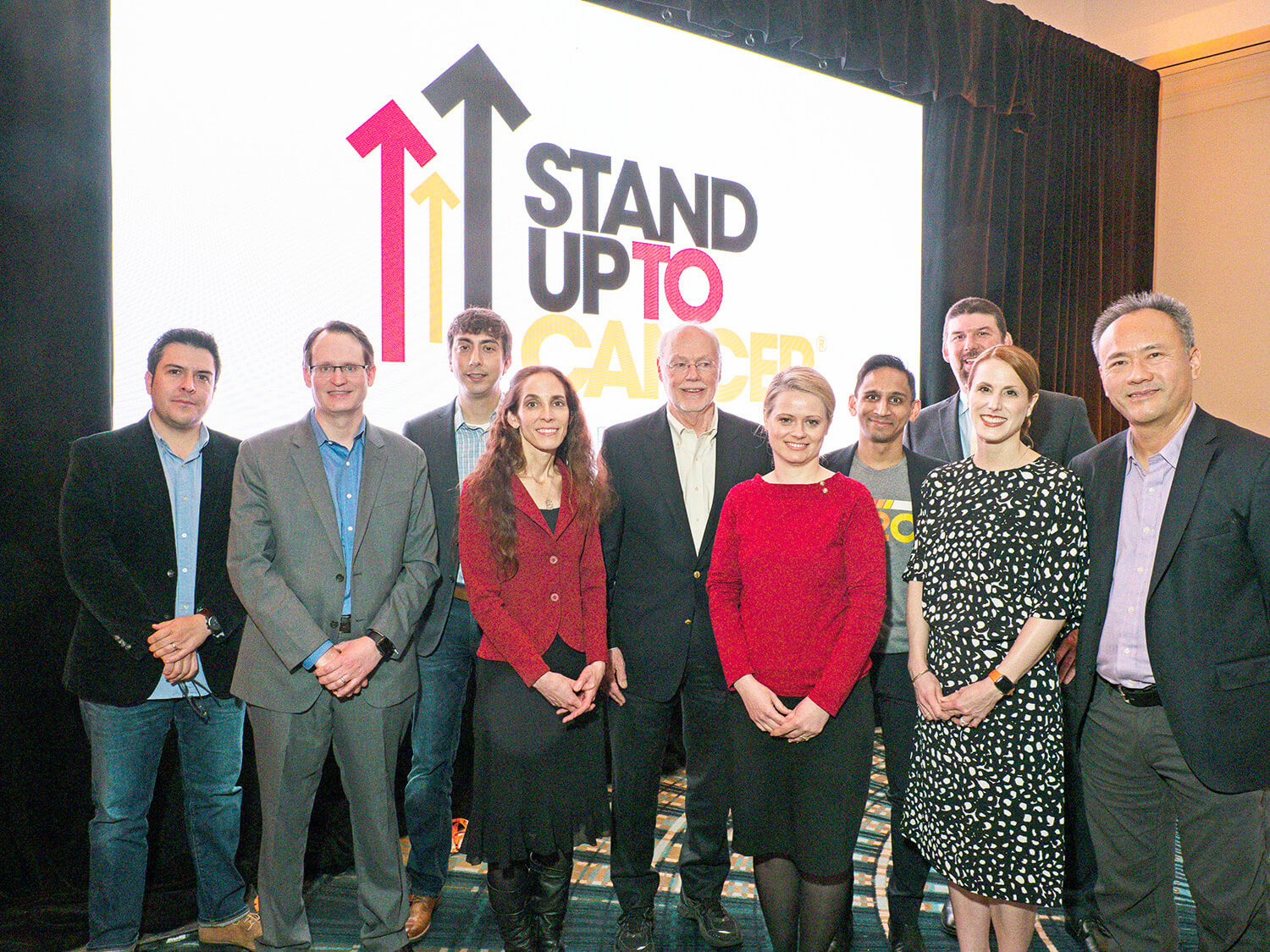Investing in the Future of Cancer Research
The AACR grants program supports researchers at every stage of their careers, representing a global commitment to understanding, preventing, diagnosing, and treating cancer. Since the program was established in 1993, the AACR has awarded more than $100 million in grants to fund meritorious research projects across the spectrum of cancer science, including basic, translational, and clinical research. Through the generous support of its partners—including nonprofit organizations, foundations, and pharmaceutical companies—the AACR fosters innovative cancer science that accelerates progress toward improved patient outcomes.
The AACR’s network of partnerships yielded several new funding opportunities in 2019:
- AACR-CRUK Transatlantic Fellowships Program. These fellowships—the first major initiative from the AACR’s international alliance with CRUK—support early-stage postdoctoral researchers in pursuing their research projects in either the United States or the United Kingdom, fostering international collaborations while launching the careers of stellar young researchers.
- AACR-MPM Oncology Charitable Foundation Transformative Cancer Research Grants. These new grants—which resulted from the unique partnership between the AACR and MPM Capital’s UBS Oncology Impact Fund (OIF)—promote and support “high-risk, high-reward” cancer research projects that could have a transformative impact on future clinical practice.
- AACR-Novocure Tumor Treating Fields Research Grants and Fellowships. These funding opportunities promote innovative basic and translational research focused on Tumor Treating Fields—intermediate frequency, low intensity, alternating electric fields that disrupt cell division in cancer cells—to accelerate the development of new treatment strategies.
- AACR-Bristol-Myers Squibb Mid-Career Female Investigator Grant. The AACR’s ongoing relationship with Bristol-Myers Squibb yielded a new joint effort to support mid-career female physician-scientists and researchers to conduct immuno-oncology research and to facilitate their advancement toward senior investigator status.
- The Bosarge Family Foundation-Waun Ki Hong Scholar Award for Regenerative Cancer Medicine. The AACR partnered with the Bosarge Family Foundation to honor Past President and Fellow of the AACR Academy Waun Ki Hong, MD, FAACR, with a grant to support postdoctoral or clinical fellows in conducting novel research in the field of regenerative cancer medicine.
- AACR-Genentech Cancer Health Disparities Research Fellowships. These new fellowships represent a joint effort between AACR and Genentech to encourage and support postdoctoral or clinical research fellows to conduct cancer health disparities research and to establish a successful career path in this field.
63
grants were awarded in 2019 to meritorious scientists from 40 institutions to support groundbreaking research in all areas of cancer science.
882
applications were evaluated for AACR grants in 2019; applicants were from the United States and 21 other countries.
$5.25 million
Amount of research grant funding awarded to 36 postdoctoral and clinical fellows to boost their career development and sustain the next generation of cancer scientists.
$6.06 million
Amount awarded to independent investigators at all career levels—including young investigators, mid-career researchers, and established scientists—to support groundbreaking cancer science.
271
Expert scientists served on 18 scientific review committees to select the 2019 grant recipients through a rigorous peer-review process. The AACR is a trusted administrator of research grants, providing expert peer review that is fair, rigorous, transparent, and timely.
STAND UP TO CANCER: A SCIENTIFIC PARTNERSHIP
A division of the Entertainment Industry Foundation, Stand Up To Cancer (SU2C) uses innovative funding models to incentivize collaborative science and support translational cancer research that accelerates the development of new cancer treatments. As the Scientific Partner of SU2C, the AACR provides expert peer review and grants administration to maximize the benefit that SU2C’s ambitious investment in cancer research delivers to patients.
SU2C Scientific Advisory Committee: New Leadership for a Bold Future
The strong leadership of SU2C’s Scientific Advisory Committee (SAC) is the key to the success of its dynamic funding models. As SU2C’s Scientific Partner, the AACR works to ensure that the SAC consists of the greatest minds in cancer research. In 2019, SU2C benefited from the bold vision of three new SAC vice-chairs: Elizabeth H. Blackburn, PhD, FAACR, a Nobel Laureate, Fellow of the AACR Academy, and AACR past president; Raymond N. DuBois, MD, PhD, FAACR, a Fellow of the AACR Academy and AACR past president; and Lee J. Helman, MD. These new members joined chair Phillip A. Sharp, PhD, FAACR, and vice-chairs Arnold J. Levine, PhD, FAACR, and William G. Nelson, MD, PhD, on this vital committee.

The new vice-chairs, who began their terms in the fall of 2018, were supported in their efforts by two new SAC members appointed in June. John D. Carpten, PhD—who also served as program chair for the AACR Annual Meeting 2019—is director of the Institute of Translational Genomics at the Keck School of Medicine of the University of Southern California. He joined the SAC while continuing to serve on SU2C’s committee on health equity in cancer clinical trials. Dr. Carpten was joined by Roderic I. Pettigrew, PhD, MD, chief executive officer of Engineering Health and executive dean for Engineering Medicine at Texas A&M University. Previously, Dr. Pettigrew was the founding director of the U.S. National Institute of Biomedical Imaging and Bioengineering (NIBIB) of the National Institutes of Health (NIH).

New Teams
Team science is at the core of SU2C’s mission. With oversight from the AACR, SU2C launched several new research teams in 2019 to address some of the greatest challenges in cancer research:
- SU2C Meg Vosburg T-Cell Lymphoma Dream Team: Tailoring CAR-based Immunotherapy Strategies to T-Cell Lymphoma
While immunotherapy is a promising new treatment approach for many cancers, the challenge in developing these treatments for T-cell lymphoma is to attack cancerous T cells without harming cells that are essential to the body’s immune response. In January, SU2C announced an $8 million Dream Team to address this challenge. Named in honor of Meg Vosburg, a lifelong learner, educator, and humanitarian, who died from T-cell lymphoma in 2018, the team is working to develop new therapeutic options for patients suffering from this rare cancer. Under the guidance of team leader Helen E. Heslop, MD, and coleader Gianpietro Dotti, MD, team members are genetically modifying the receptors on patients’ T cells, enabling them to recognize the lymphoma cells and kill them.

- SU2C Canada Metastatic Breast Cancer Dream Team
In August, SU2C Canada partnered with the Canadian Cancer Society (CCS) and the Canadian Institutes of Health Research (CIHR) to launch the SU2C Canada Metastatic Breast Cancer Dream Team. The organizations provided up to $6 million CAD to fund the development of a new drug combination that may help stop breast cancer metastasis by disrupting the manufacture of proteins that the cancer cells need to spread to other organs of the body. The first phase of funding supports the initial clinical trial of the drug regimen. Team leader Nahum Sonenberg, PhD, and coleader Michael N. Pollak, MD, will conduct the trial of about 40 patients, who will receive treatment at BC Cancer in Vancouver, the University of Alberta in Edmonton, and McGill University in Montreal. Subsequent phases of funding will support additional preclinical and clinical studies.
- SU2C Catalyst® Research Teams: Triple-Negative Breast Cancer and Metastatic Prostate Cancer
The SU2C Catalyst® program is a unique collaboration between industry and academic scientists to accelerate the pace of groundbreaking translational research by providing investigators with medicines, materials, and funding donated by industry and encouraging them to develop new uses for these resources to benefit cancer patients. In September, SU2C partnered with Founding Collaborator Genentech, a member of the Roche Group, on a $6 million project to create two teams of experts to explore new approaches to two cancers that have defied conventional treatment: - Triple-Negative Breast Cancer. Team leader Elizabeth A. Mittendorf, MD, PhD, and clinical lead Angela DeMichele, MD, are investigating whether a combination of two Genentech drugs, ipatasertib and atezolizumab, can prevent recurrence of this disease.
- Metastatic Hormone-Sensitive Prostate Cancer. The current treatment standard for this disease, hormone therapy, only delays progression for most patients. Team leader Sean M. McBride, MD, and clinical lead Dana E. Rathkopf, MD, are working to improve outcomes for these patients by combining Genentech’s atezolizumab with abiraterone and stereotactic body radiation therapy (SBRT).
Pancreatic Cancer Collective
Through a strategic partnership with the Lustgarten Foundation, SU2C formed the Pancreatic Cancer Collective (PCC) in the spring of 2018 in a focused effort to improve outcomes for a disease with a current five-year survival rate of 8 percent. With the support of the AACR, SU2C’s Scientific Partner, the collective took bold steps toward that goal in 2019:
- PCC Summer Symposium. The AACR organized this symposium in July, bringing together more than 100 leaders in the field of pancreatic cancer. Through lectures and poster presentations, these experts shared the latest developments in the field.
- New Therapies Challenge Grants. Seven research teams began work in 2019 on the first projects funded by the new PCC New Therapies Challenge Grants. Announced in late 2018, the grants provide the following teams with up to $1 million each in initial funding, with another $4 million awarded to selected teams to support clinical studies on the most promising projects:
- Adoptive Transfer of TGF-β Resistant TIL to Defeat Immunosuppressive PDAC
Team leader: Patrick Hwu, MD, University of Texas MD Anderson Cancer Center
Coleaders: Chantale Bernatchez, PhD, and Cliona M. Rooney, PhD - Combined Targeting of MEK1/MEK2 and Autophagy for Pancreatic Cancer Therapy
Team leader: Martin McMahon, PhD
Coleader: Eric A. Collisson, MD - Exploiting DNA Repair Gene Mutations in Pancreatic Cancer
Team leader: Alan D. D’Andrea, MD
Coleader: James M. Cleary, MD, PhD - Immunotherapy Targeting Mutant KRAS
Team leader: Robert H. Vonderheide, MD, DPhil
Coleaders: Elizabeth M. Jaffee, MD, FAACR, and Beatriz M. Carreno, PhD - Molecularly Targeted Radionuclide Therapy via the Integrin AlphaVBeta6
Team leader: Julie L. Sutcliffe, PhD
Coleader: Richard L. Bold, MD - Targeting SHP2 in Pancreatic Cancer
Team leader: René Bernards, DPhil, FAACR
Coleaders: Emile E. Voest, MD, PhD, and Hana Algül, MD, MPH - Targeting Stem Cell Signals in Pancreatic Cancer
Team leader: Tannishtha Reya, PhD
Coleaders: Andrew M. Lowy, MD, and Margaret A. Tempero, MD
Phillip A. Sharp Innovation in Collaboration Awards
SU2C research teams bring together leading scientists to work together to solve key problems in cancer research. The Phillip A. Sharp Innovation in Collaboration Awards encourage these leaders to identify unique approaches to these problems and form new partnerships to pursue them. Named for Phillip A. Sharp, PhD, FAACR, chair of the SU2C Scientific Advisory Committee, the awards provide these new teams with grants of up to $250,000 to foster these promising collaborations. In May, SU2C announced the launch of five new projects with the potential to accelerate progress for the benefit of cancer patients:
- Resistance to PARP inhibitor plus anti-PD1 therapy driven by ER stress and bioactive lipids in ovarian cancer
Leaders: Alan D. D’Andrea, MD, and Juan R. Cubillos-Ruiz, PhD - Uncovering mutant TP53 dependencies in spontaneously arising triple-negative breast cancer
Leaders: Denada Dibra, PhD, and Peter P. Lee, MD - Noninvasive monitoring of tumor phenotype by interrogation of plasma cell-free RNA
Leaders: Maximilian Diehn, MD, PhD, and Aaron N. Hata, MD, PhD - Precision combinatorial immunotherapeutic targeting of thymic stromal lymphopoietin receptor (TSLPR) signaling in pediatric and young adult CRLF2-rearranged ALL
Leaders: Sarah K. Tasian, MD, and Kimberly Stegmaier, MD - Antigenicity of mutant KRAS and impact on cancer evolution
Leaders: Robert H. Vonderheide, MD, DPhil, and Vinod P. Balachandran, MD
